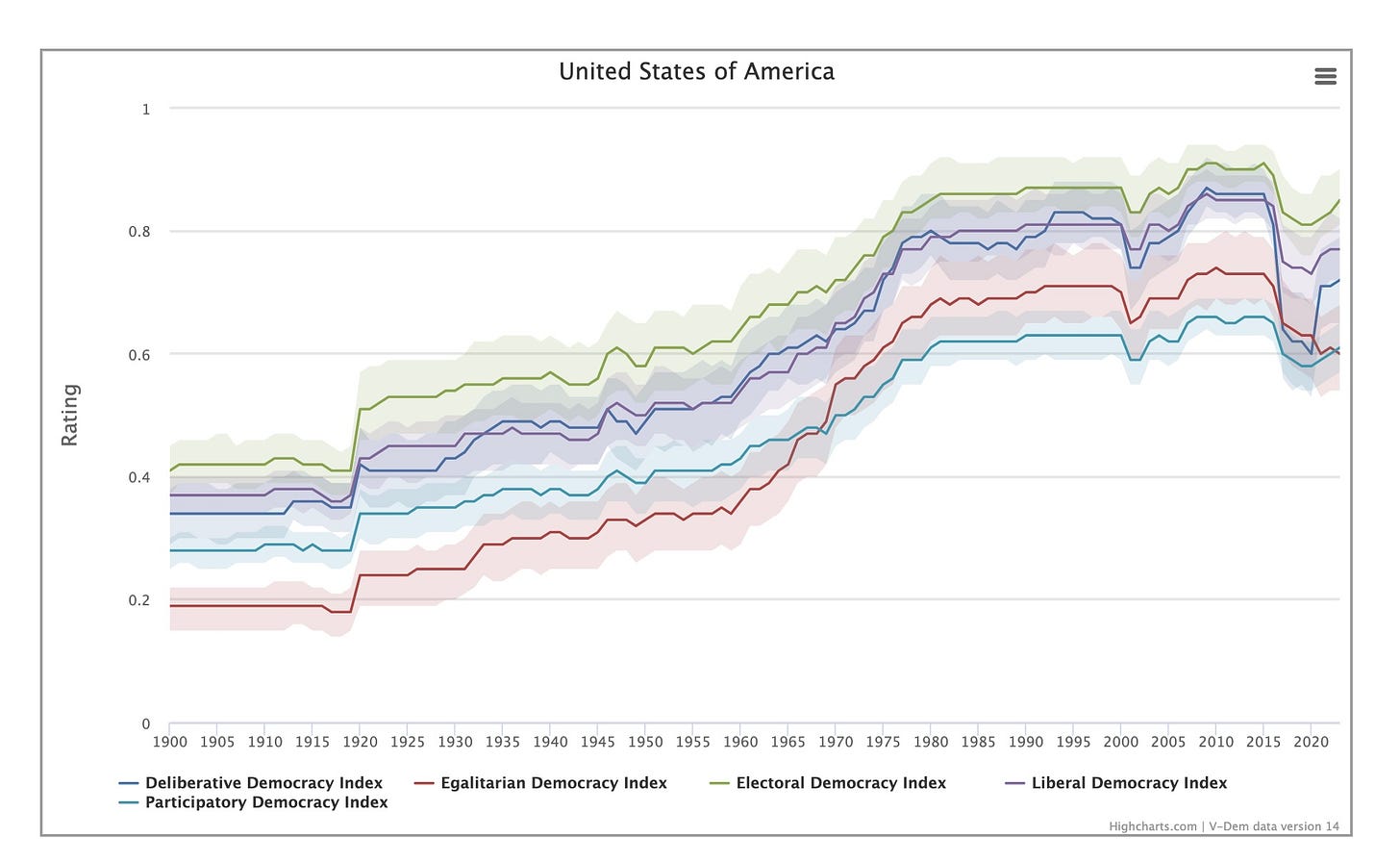With Autocracy Surging, It's Worth Exploring a Paper Charting "U-Turn" Reversals to Democratization
Trump's not there yet, but....
Updated post-show: As Trump’s second term races through its “shock and awe” phase, I hope you’ll listen to, and share, my conversation with several authors of an important new study showing that, between 1900 and 2023, more than half of the world’s autocratic regimes were followed by a “u-turn” pattern toward restored or improved levels of democracy.
Watch, engage and share the conversation on LinkedIn, Facebook, X/Twitter or YouTube.
That u-turn phenomenon is good to see because the organization where four of the fiive study authors work, the V-Dem Institute at the University of Gothernburg in Sweden, charts democratic vital signs and its 2024 report found very troubling trends worldwide:
The new study, When autocratization is reversed: episodes of U-Turns since 1900, was just published in the journal Democratization. The abstract to the open-access paper lays out both the findings and their significance. Here’s the most newsworthy section:
The world is in a “wave of autocratization.” Yet, recent events in Brazil, the Maldives, and Zambia demonstrate that autocratization can be halted and reversed. This article introduces “U-Turn” as a new type of regime transformation episode in which autocratization is closely followed by and linked to subsequent democratization….
The analysis presents a systematic empirical overview of patterns and developments of U-Turns. A key finding is that 52% of all autocratization episodes become U-Turns, which increases to 73% when focusing on the last 30 years. The vast majority of U-Turns (90%) lead to restored or even improved levels of democracy. The data on U-Turn episodes opens up new avenues for research on autocratization and democratization that were previously treated as isolated processes, particularly it could help us understand why some processes of autocratization trigger a successful pro-democratic backlash – a critical question during the starkest-ever wave of autocratization.
It’s worth noting that while Trump’s team is racing to reinforce presidential power, the United States still very much a democracy.
In the 2024 V-Dem report, the United States, despite a downturn starting during the first Trump presidency and pandemic, still scored well. Explore the dynamic version of the graph here.
But there’s no reason to presume that such a trend is destiny considering the amplification of presidential powers since Trump’s first term.
Below you can read an excerpt from the V-Dem Institute report on the United States (the report was published before the November election). As you read, consider what’s unfolding in the first weeks of Trump’s second term - including this statement tweeted on Sunday by Vice President JD Vance: “[J]udges aren’t allowed to control the executive’s legitimate power.”
Think of how much rests on who defines the word “legitimate.”
Here’s the relevant V-Dem report section:
The election in the United States is likely to be highly consequential. The expected Republican nominee and former President Donald Trump undermined American democracy substantially during his previous tenure, not least regarding media freedom, judicial independence, and executive oversight. Among the innumerable anti-democratic statements, Trump has called his opponents “vermin” during campaign speeches, declared he wants to purge the Department of Justice and dismantle the FBI, pardon himself of federal crimes, and have journalists arrested.120 A second presidential term for Trump could have significant ramifications also for democracy internationally given the United States’ key role in world affairs and the affinity for autocrats Trump sported during his first term.
For an independent assessment of the particularly unsettling characteristics of the Trump Musk power push, read this recent
column by N.Y.U. professor Ruth Ben-Ghiat:Here’s an excerpt from Ben-Ghiat’s post:
What is happening now builds on classic authoritarian dynamics as I described them in Strongmen and in many essays for Lucid. There is always an “inner sanctum” that really runs the show, with its mix of family members and cronies, some with histories of working with or for foreign powers. And there is almost always a purge of the federal bureaucracy. That is now being carried out on a mass scale….










